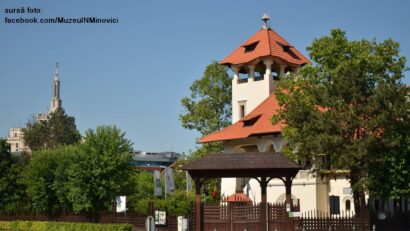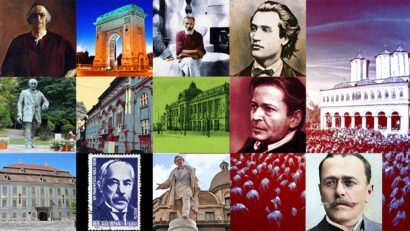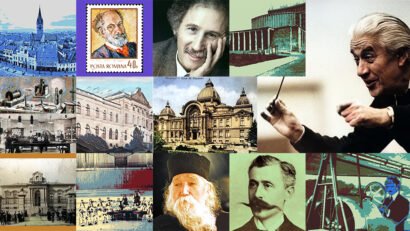Writer and dissident I.D. Sîrbu

Christine Leșcu, 06.03.2021, 14:00
Ion Desideriu Sîrbu holds a special place
among the intellectuals opposing the communist regime. He truly wrote what
people call drawer literature, as many of his books remained unpublished due
to communist censorship. After the collapse of the communist dictatorship, some
of his volumes were published, and brought to light the model of Victor
Petrini, the protagonist in Marin Preda’s The
most beloved of earthlings. Just like Petrini, I.D. Sîrbu was a philosopher
sentenced to prison in the 1950s for refusing to denounce his teacher, playwright,
poet and philosopher Lucian Blaga. Dana Jalobeanu, a professor with the
Philosophy Department at the University of Bucharest, told us more about
Sîrbu’s missed philosophical vocation, but also about his great talent for
writing.
Sîrbu
took his PhD in philosophy. He was a student and disciple of phisolophers
Lucian Blaga and Liviu Rusu, both with the Unviersity of Cluj. At one point,
when he was 28, he became the youngest associate professor at the Phisolophy
Faculty in Cluj. Years later, as he himself writes, he became the oldest
wagon-pusher at the mine in Petrila, aged 44. Ion
Desideriu Sîrbu was someone whose fate was fiercely trampled by the cruel history
of the 20th century. He survived writing literature, which was his
way of taking revenge for being denied a career in philosophy. Shortly after
1990, his novel, Farewell, Europe, had a huge impact. I couldn’t believe
people could write something like that under communism. It wasn’t the only
novel to be released, there was also a collection of letters, Letters to
merciful God and The journal of a journalist without a journal. In the
1990s, therefore, I was amazed to discover this author known to very few
people, as only part of his writings and theatre plays had been published by
communist authorities. Besides, there was this powerful aura surrounding Ion
Desideriu Sîrbu. And people who actually knew him well were very surprised by
the power of his literature.
Arrested in 1956 and condemned as an enemy
of the regime, at first for a year, then his sentence being commuted to seven
years, Ion Desideriu Sîrbu worked in a mine, shortly after his release. The area
was familiar to him, as he himself was the son of a miner, born in 1919 in the
Petrila exploitation site close to the city of Petroșani. In 1964, he was
forcefully relocated to Craiova, where he managed, after great efforts, to get
a job with the National Theatre as a literary secretary. He was constantly
watched by the local and central secret police. Still, his moral compass remained
pristine, as literary critic Cosmin Ciotloș told us.
This is someone who, no matter how many ordeals he suffered,
no matter how many years he spent in prison unlawfully, refused become an
informer for the secret police. He refused to become a collaborator, and he
actually wrote about it. He came from a miners’ colony in Petrila, where
turning in your fellow workers was the lowest you could get, as Sîrbu
himself writes. It was the lowest line of moral integrity anyone could cross.
At one point, Sîrbu wrote: ‘Judge me not for what I’ve done, but for all the
things I haven’t done, I’ve refused to do, although I could have. This was his
first stand. There’s another episode he recounted about his time in prison. All
Christian religions were represented in prison, and Sîrbu managed to persuade
his fellow inmates to celebrate Easter together, all on the same night. It was
an ecumenical gesture, it goes without saying. But to me, it is more than that.
I see a man who’s struggling to bring together religious sentiment. To him, the
purpose of that moment was to save the souls of those people.
Right now, Sîrbu’s home in Petrila has
been turned into a Memorial House, hosting a cultural center curated by
cartoonist Ion Barbu, who knew the writer.
I met I.D. Sîrbu for the first and last
time in 1988. He had come for a summer visit to Jiu Valley, as his sister,
Irina Sîrbu lived in Petroșani. One afternoon he decided to walk from his
sister’s house to his parents’ house, in Petrila, accompanied by me and my brother,
Mihai Barbu. We walked 4 kilometers, making numerous stopovers and telling
stories about the old Jiu Valley. When we reached his house, we crossed the
cemetery, visited his parents’ graves, and even stopped the local school where
I was doing voluntary work with children. I was teaching a drawing class,
creating a history of Romanian literature by drawing portraits of writers. Some
of them drew a sketch of Sîrbu, which was later included in an exhibition
opened at the Museum of Romanian Literature in Bucharest. We then went to my
apartment, where we spent another couple of hours. In the end, we shook hands
and I’ve been boasting ever since I was the last man in Petrila he ever shook
hands with. He was the warmest person I had ever met, telling some amazing
stories that have earned my everlasting admiration of him.
Passed away in 1989 after struggling with
esophageal cancer, Ion. D. Sîrbu never got to see the demise of the communist
regime, which came three months after his death. (V.P.)






























